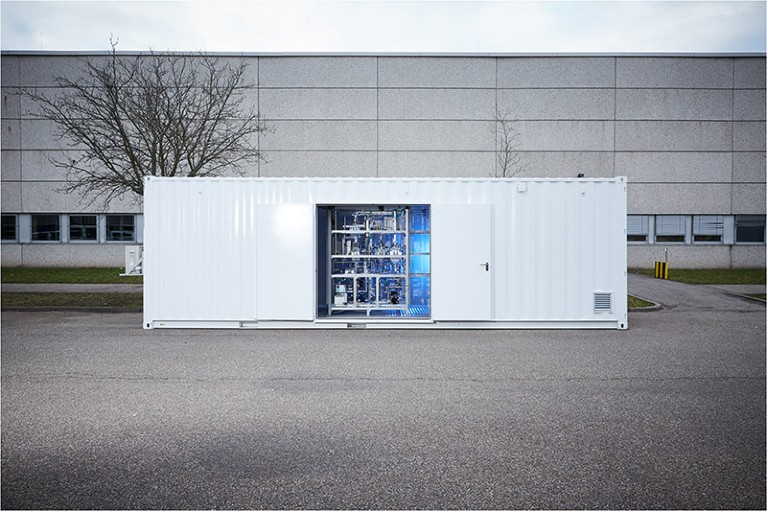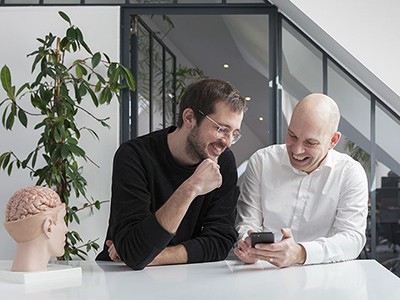
Ineratec build compact chemical reactors that fit into shipping containers.Credit: Magali Hauser
At a start-up expo at the German Ministry of Economic Affairs and Energy in October 2018, paediatric cardiologist Boris Schmitt apologized for missing his own research group’s pitch earlier in the morning. “I was in the operating room,” he explained.
Schmitt recently co-founded a Berlin-based start-up firm called Grown Valve, a spin-off from research conducted at the Charité University Medicine Berlin and the German Heart Centre Berlin (DHZB). The company is developing an innovative technique to repair the heart valves of children with birth defects, a life-threatening problem that affects hundreds of thousands of children around the world.
Because a child’s heart is constantly growing, the artificial heart valves devised for adults are not suited for long-term use. Schmitt has been working on a solution to this problem for almost a decade. He led a laboratory at the German Heart Center until last year, when he and his co-founders got a grant from the German Ministry of Economic Affairs and Energy to turn Schmitt’s heart-valve research into a commercially available product.
Schmitt is the first to admit that the transition to entrepreneurship has been tough. “It’s scary. It’s not my world,” he says. “Being a doctor might be more stressful in the short term, but founding a start-up is more stressful in the long term.”
Investing in entrepreneurs
Schmitt is just the kind of person the German government hopes to help. The country’s start-up scene is booming, with nearly €4.3 billion (US$4.9 billion) of public and private investment in German start-up firms in 2017 — an 88% jump from the year before.
The government support — and the blossoming of hundreds of research-oriented start-ups — is reflective of a shift in the attitudes towards start-up companies and entrepreneurship in Germany. For scientists or engineers, the risk of working for or founding a start-up company is much more attractive than it was ten years ago (see ‘No more career headaches’).
But Germany’s government, worried about losing the country’s edge in innovation to competitors in the United States, began funding research-oriented start-up firms more than a decade ago, an effort that has borne fruit. And more recently, observers say, ‘innovation forums’ and start-up competitions have become a regular feature of everything from real-estate trade fairs to global health conferences. “It’s become part of the zeitgeist,” says Shari Langemak, who is director of innovation at the Cereneo Center for Neurology and Rehabilitation in Vitznau, Switzerland, but is based in Berlin. “Before people were thinking innovation would come out of established companies, but they moved too slow. Now suddenly everyone’s talking about start-ups and their importance for the economy.”
Perhaps the defining characteristic of Germany’s research start-up scene is the ample public money earmarked for early-phase entrepreneurs. Schmitt’s heart-valve project, for example, is being funded by a grant from the Federal Ministry for Economic Affairs and Energy.
For researchers working at or graduating from German universities and technical schools, there are dozens of funding mechanisms designed to help researchers make the tricky transition from lab to market. “There’s lots of public funding available here,” says Bettine Gola, innovation manager for medical technology and digital health at Berlin Partner for Business and Technology, the German capital’s economic development agency. “And you’re more likely to receive public funding when you’re a research-driven start-up.”
The role of the state
Philipp Engelkamp, a co-founder of the renewable-energy start-up firm Ineratec in Karlsruhe, says that public funding was crucial when he and his partners were trying to get their business off the ground. Ineratec’s product — a compact chemical reactor that can convert waste gases into liquid fuels and other chemicals — is based on decades of research at the Karlsruhe Institute of Technology.
Engelkamp and his co-founders applied for funding with the help of the Karlsruhe Institute, where several of the founders were based. Ineratec secured funding to help make its research commercially viable, including more than €1 million in grants for equipment and stipends for the founders, sourced from funds at the state and federal level.
One of Ineratec’s key funders was EXIST, one of the country’s most prestigious incubators. Since 2006, the programme has given out over €500 million to more than 2,000 projects.
The money is channelled through universities and comes in the form of either a business start-up grant to support researchers for a limited time as they work to launch companies or as a transfer of research grant of €1 million on average for translating more expensive, high-risk projects into commercially viable products.
Other funding schemes include state-level programmes. Berlin, for example, offers a six-month stipend to teams who leave the German capital’s research institutions to start a firm. And many states offer similar support to entrepreneurs emerging from their university systems, such as the Junge Innovatoren (‘Young Innovators’) programme in Baden-Württemberg, which Engelkamp and his partners tapped when they were starting Ineratec.
Bringing in business sense
Another key element of EXIST and many other funding programmes is an emphasis on teams and training. The groups that are successful in their funding applications often feature team members with a Master of Business Administration (MBA) or equivalent experience in addition to members with a research background.
Bringing in business talent is essential, because the majority of German researchers lack industry experience. “Most researchers have never had the experience of working at a company, let alone running one,” says Jasper Emeis, a business-school graduate who is working with Schmitt to get Grown Valve off the ground. “They’re totally overwhelmed by the business part.”
For researchers looking to spin their research into start-up gold, conditions in Germany have never been better — but that doesn’t mean Germany is the best fit for every business. Medical-technology start-up firms have to contend with Germany’s stringent regulatory system and privacy laws. For example, Langemak says a long-standing ban on treating patients remotely has made things tough for telemedicine-oriented start-ups, and companies in the health space have to first win over German insurers, as most patients are used to being fully covered. (Germany’s doctor’s association recommended lifting the ban last year.)
And there’s a lingering cultural bias against researchers commercializing their own work. “Many medical doctors and researchers want to be entrepreneurs, but don’t feel comfortable with the way business is done,” says Langemak, who trained as a doctor before earning an MBA. “They struggle to communicate why this is a great product.”
Steffen Terberl, head of the Profund Innovation office at the Free University of Berlin, admits that more experienced researchers have traditionally seen spin-offs as a distraction. “They are often afraid that their fundamental research would suffer,” he notes.
Open to the world
Terberl says that at universities in Berlin and elsewhere in Germany, an influx of researchers from abroad — particularly from countries with a long tradition of bench-to-business translation efforts, such as the United Kingdom, Israel and the United States — is helping to change that academic culture.
And the start-up scene itself is as open to scientists from abroad as the university system. Nationality, entrepreneurs say, is no barrier when it comes to accessing funding or working in the start-up scene. Take Clue, a menstruation-tracking app founded in Berlin in 2012 by Ida Tin, a Danish entrepreneur. As the app has grown to encompass more than 10 million active users, Tin has recruited researchers from around the world to relocate and work at the company. “Germany has pretty generous visa laws, and that’s crucial for us,” Tin says. “It’s a good place to attract and retain talent.”
There’s a flip side to generous public support, however. Engelkamp and Langemak say that German researchers are often too concerned with perfecting their product and are not comfortable with the ‘fail fast’ ethos that is prevalent among their US counterparts.
German investors, too, are less eager to make big bets. Banks and venture-capital funds need to be won over, often through a painstaking, months-long due-diligence process. However, Engelkamp says that this is not a substantial problem: “You can find money in Germany, and we have. But this ‘moonshooting’ vision of growing very big and not caring about the initial investment is missing.”



 Career Guide: Germany
Career Guide: Germany
 An introduction to the complexities of the German research scene
An introduction to the complexities of the German research scene
 How Germany is winning at turning its research to commercial application
How Germany is winning at turning its research to commercial application
 Ten reasons to move to Germany as a researcher
Ten reasons to move to Germany as a researcher
 Scientists in Germany identify first hybrid hominin
Scientists in Germany identify first hybrid hominin
 The science of starting a new life
The science of starting a new life
 British chemist battles xenophobia in Germany
British chemist battles xenophobia in Germany
 Germany faces its future as a pioneer in sustainability and renewable energy
Germany faces its future as a pioneer in sustainability and renewable energy
 The second coming of solar
The second coming of solar
 Ten research collaborations between Germany and the rest of the world
Ten research collaborations between Germany and the rest of the world
 Sexism is still a problem for German research
Sexism is still a problem for German research
 Preceded by 967 men: meet the first woman in charge of the 600-year-old Leipzig University
Preceded by 967 men: meet the first woman in charge of the 600-year-old Leipzig University
 No more career headaches
No more career headaches







